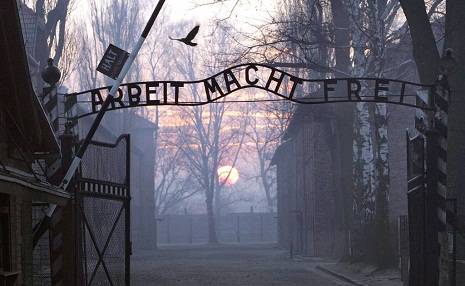Groening worked as a book-keeper at the death-camp and was known as the “Accountant of Auschwitz”. He is on trial for accessory to murder in the deaths of 300,000 people.
Kor originally tried to shake his hand on the first day of the trial but Groening but, when she approached him, he passed out as he realised who she was.
“At that moment he was not a Nazi but an old man who fainted,” the holocaust survivor wrote in a blog post on the website Quora.
She wanted to shake hands with ex-death cam worker because, as she says: “I am interested in what will happen when someone from the victim’s side meets with someone from the perpetrator’s side. You can’t predict it.”
After the court session concluded she approached Groening once more. He tried to stand once again but Kor told to remain seated and shake her hand.
“I just shook his hand and said, ‘I appreciate the fact that you are willing to come here and face us. But I would like you to appeal to the old Nazis who are still alive to come forward and address the problem of neo-Nazis in Germany today.’”
Once she had delivered her message, Groening’s reaction took her by surprise: he grabbed her and gave her a kiss on the cheek.
“I probably wouldn’t have gone that far, but I guess it is better than what he would have done to me 70 years ago,” wrote Kor.
The handshake was captured in an emotive photo and has, perhaps inevitably, generated a great wave of effusive praise as well as criticism.
Kor writes that she realised the photo would be divisive: “I know many people will criticise me for this photo, but so be it. It was two human beings seventy years after it happened.”
She explained that she travelled over 4,000 miles for the handshake to promote a way of bringing victims and perpetrators of crimes together.
A Holocaust survivor has explained why she shook the hand of a former Nazi Auschwitz worker currently on trial in Germany for his role in the murder of 300,000 prisoners.
Eva Kor, 81, travelled from her home in the U.S to Germany for the trial of Oskar Groening. She and her twin sister were subjected to medical experiments by the infamous Joseph Mengele before the camp was liberated.
Groening worked as a book-keeper at the death-camp and was known as the “Accountant of Auschwitz”. He is on trial for accessory to murder in the deaths of 300,000 people.
Holocaust Memorial Day 2015: Haunting images of Auschwitz
20 of 20
Auschwitz-BirkenauAuschwitz-BirkenauAuschwitz-BirkenauAuschwitz-BirkenauAuschwitz-BirkenauAuschwitz-BirkenauAuschwitz-BirkenauAuschwitz-BirkenauAuschwitz-BirkenauAuschwitz-BirkenauAuschwitz-BirkenauAuschwitz-BirkenauAuschwitz-BirkenauAuschwitz-BirkenauAuschwitz-BirkenauAuschwitz-BirkenauAuschwitz-BirkenauAuschwitz-BirkenauAuschwitz-BirkenauAuschwitz-Birkenau
Prev
Auschwitz-BirkenauAuschwitz-BirkenauAuschwitz-BirkenauAuschwitz-BirkenauAuschwitz-BirkenauAuschwitz-BirkenauAuschwitz-BirkenauAuschwitz-BirkenauAuschwitz-BirkenauAuschwitz-BirkenauAuschwitz-BirkenauAuschwitz-BirkenauAuschwitz-BirkenauAuschwitz-BirkenauAuschwitz-BirkenauAuschwitz-BirkenauAuschwitz-BirkenauAuschwitz-BirkenauAuschwitz-BirkenauAuschwitz-Birkenau
Kor originally tried to shake his hand on the first day of the trial but Groening but, when she approached him, he passed out as he realised who she was.
“At that moment he was not a Nazi but an old man who fainted,” the holocaust survivor wrote in a blog post on the website Quora.
She wanted to shake hands with ex-death cam worker because, as she says: “I am interested in what will happen when someone from the victim’s side meets with someone from the perpetrator’s side. You can’t predict it.”
Oskar Groening is facing charges of being accomplice to the murder of 300,000 people at the Auschwitz concentration camp Oskar Groening is facing charges of being accomplice to the murder of 300,000 people at the Auschwitz concentration camp
After the court session concluded she approached Groening once more. He tried to stand once again but Kor told to remain seated and shake her hand.
“I just shook his hand and said, ‘I appreciate the fact that you are willing to come here and face us. But I would like you to appeal to the old Nazis who are still alive to come forward and address the problem of neo-Nazis in Germany today.’”
READ MORE:
NICK CLEGG GUARANTEES FUNDS FOR LESSONS ON THE HOLOCAUST
OSCAR GROENING ADMITS HE WAS `MORALLY COMPLICIT` IN HOLOCAUST CRIMES
IS `MEIN KAMPF` TOO DANGEROUS FOR PUBLIC?
Once she had delivered her message, Groening’s reaction took her by surprise: he grabbed her and gave her a kiss on the cheek.
“I probably wouldn’t have gone that far, but I guess it is better than what he would have done to me 70 years ago,” wrote Kor.
The handshake was captured in an emotive photo and has, perhaps inevitably, generated a great wave of effusive praise as well as criticism.
Kor writes that she realised the photo would be divisive: “I know many people will criticise me for this photo, but so be it. It was two human beings seventy years after it happened.”
She explained that she travelled over 4,000 miles for the handshake to promote a way of bringing victims and perpetrators of crimes together. “For the life of me I will never understand why anger is preferable to a goodwill gesture… The energy that creates anger is a violent energy.”
She says the world simply won’t work out if accusers and the accused stand in different corners and never connect.
“I don’t think we should raise a statue in his honour, but he can serve as a good example to young people that what he participated in was terrible, that it was wrong, and that he is sorry that he was part of it.
“Now there is a message that has some usefulness for society.”
More about:
















































